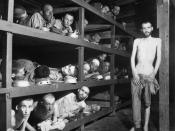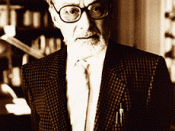Although Primo Levi was the recipient of good fortune, he fundamentally survived Auschwitz because of resourceful improvisation and his ability to maintain a sense of humanity. Levi was not a particularly strong and capable prisoner and could easily have become a 'muselmann'. However, he was able to overcome his physical weaknesses by using his initiative to survive the brutality of the Lager. "To escape from Auschwitz was no small fortune" (p.57).
Survival was the highest priority. Häftlinge had to be cunning and those who conformed to the myriad of rules perished. "For those who had no sound inner resources, for those who did not know how to draw from their own consciences" (p.39) were unable to cling to life. Levi learned that to survive he must "build around himself a tenuous barrier of defence" (p. 62). He sought to steal items of value and bargain with fellow Häftlinge for additional resources.
However, he also discovered that other Häftlinge could equally steal from him, and so Levi learnt to become increasingly perceptive. "The law of the Lager said: 'eat your own bread, and if you can, that of your neighbour'" (p.166).
Levi developed a suspicious mind and learnt never to reveal his secrets of success. He did not extend a helping hand unless it was to his benefit. "If someone finds a new method of avoiding the hardest work or a new art which yields him an ounce of bread, he will try to keep his method secret" (p.94). He will be revered by others, will become stronger and thus increase his chances of survival. There was no rest in the struggle to survive. "Everyone was desperately and ferociously alone" (p.94). Levi had no choice but to reject his peers as they created an unwanted burden.
Levi realised that he was...


